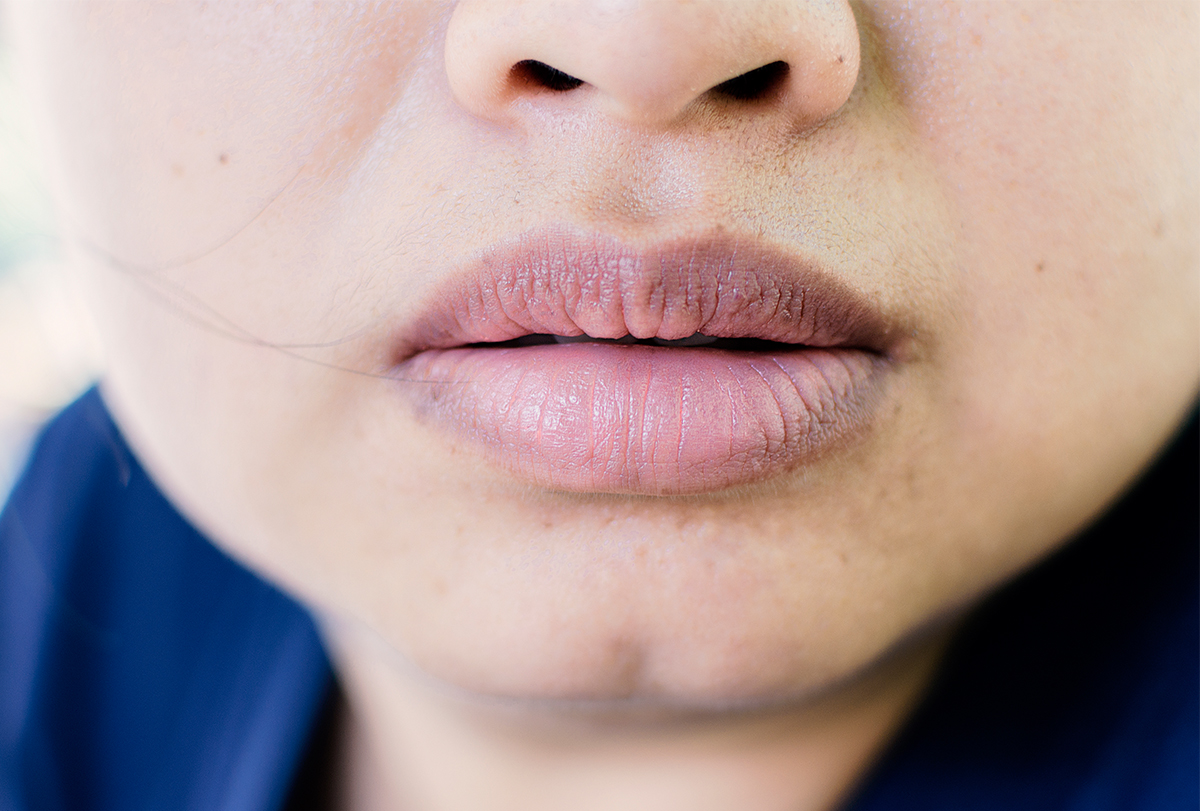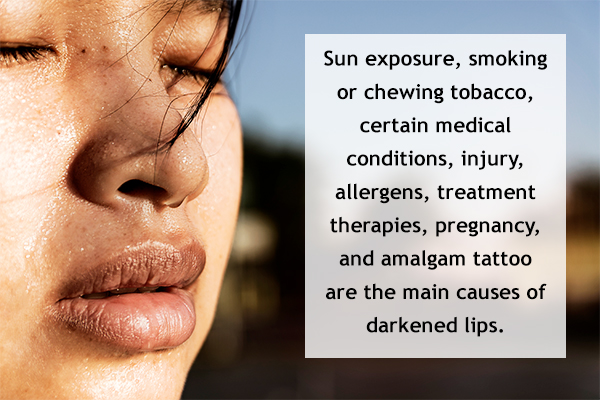In this article:
The lips are frequently exposed to allergens, ultraviolet radiation, and pollutants. Moreover, the skin of your lips is thinner than that of other body parts, making it highly sensitive. Therefore, environmental factors such as those mentioned above can quickly affect the lips, often causing pigmentation or lesions.

While such changes are usually reversible, they may be symptomatic of an underlying problem. Moreover, lips that become dry or dark can be bothersome. Therefore, it is imperative to consult a doctor if you notice the development of dark spots or lesions on your lips.
Melanin Pigment and the Lips
Melanin is the coloring pigment released by melanocyte cells present in the skin layers. The amount of melanin produced differs among ethnicities and races, hence the varying skin colors.
Since the lips are made of skin layers as well, they also contain melanocyte cells. In certain cases, melanin production or the number of melanocyte cells may increase, turning your lips black, blue, brown, or gray.
However, your lips can also darken without any changes in melanin content. (1)
Possible Causes of Darkening of the Lips

The following factors can contribute to darkening of the lips:
1. Sun exposure
Excessive exposure to sun rays without any sunscreen can stimulate an overproduction of melanin, leading to hyperpigmentation of the lips. This is more common in people with light-colored to medium-colored skin and the elderly. (2)
2. Smoking/chewing tobacco
This is one of the most common reasons for darkening of the lips. It can also be characteristic of smoker’s melanosis. (3)
3. Medical conditions
Certain medical conditions can also cause hyperpigmentation of the lips. These include:
- Peutz-Jeghers syndrome
- Laugier-Hunziker syndrome (4)
- Actinic keratosis
- Familial lentiginosis syndromes (5)
- HIV infection (6)
- Vitamin deficiency
- Increased concentration of iron
- Hormonal disorders
- Angiokeratoma
- Anemia
- Mucosal melanoma
- Venous lake
4. Injury
Any trauma to the lips may cause them to turn bluish black. The intensity of the discoloration chiefly depends upon the degree of degradation and the lesion age. (1) Trauma can also lead to the development of melanoacanthoma, which appears as a deeply pigmented area. (7)
5. Allergens
Allergic reactions to chemicals in cosmetics or toothpaste, such as cheilitis, may lead to darkening of the lips. (8)
6. Treatment and therapies
Dark lips can also occur as a side effect of chemotherapy or radiation therapy. (1) Drugs used in cancer therapy, antimalarials, antipsychotics, and anticonvulsants can also cause pigmentation of the lips. (9)
7. Pregnancy
At times, the changes in hormone levels during pregnancy may cause melasma, which can manifest as dark patches on the lips. (1)
8. Amalgam tattoo
This refers to the development of a blue, black, or gray lesion on the lips or other parts of the mouth due to the deposition of amalgam filling. (10)
Symptoms Associated With Darkening of the Lips
Darkening of the lips may often be accompanied by the following symptoms:
- Raised lesions
- Dark-brown macules that are irregularly shaped and well demarcated
- Lentigines in other body parts
- Dryness and cracking of the lips
- Oral pigmentation
- Swelling
- Burning
- Itching
Medical Treatment for Hyperpigmented Lips

The treatment for dark lips depends on the underlying cause. In general, the first step in treatment is to avoid the causative factor.
- Melanosis caused by tobacco use commonly resolves on its own in 3 years after smoking cessation. (11)
- The doctor may prescribe corticosteroids and topical calcineurin inhibitors if the cause is an inflammatory response.
- Topical retinols and retinoid treatments can help clear hyperpigmentation.
- Benign spots or lesions can be managed with the help of: (12)(13)(14)
- Carbon dioxide lasers
- Pigment-specific lasers
- Kojic acid treatment
- Liquid nitrogen spray
- Chemical peels
- Malignant pigmentation is generally treated with Mohs micrographic surgery or excision.
- Skin lightening creams may also be used. However, they may contain toxic metals such as mercury, which can cause heavy metal poisoning. (15)
- If there is an infection, antimicrobials may be prescribed.
Diagnosing the Cause of Darkening Lips
To understand the cause of your darkened lips, the doctor will do the following:
- Take your medical history and family history
- Ask about the cosmetics you use
- Perform a physical examination of lips for the pattern, color, and distribution of pigmentation and the appearance of lesions
- Perform a dermatologic examination of the mouth, hair, nails, and whole body in general
If the doctor suspects any lesion to be malignant, he may order a biopsy of the tissue for further diagnosis. (6)
Risk Factors Affecting Darkening of the Lips
The following factors can predispose you to dark lips:
Possible Complications

It is common for the lips to darken with age. However, hyperpigmentation can indicate underlying disorders, which, when left untreated, can give rise to complications such as:
- Spread of lesions
- Oral ulceration
- Cancer
- Bleeding on the lips
When to See a Doctor
It is suggested to consult a doctor if the hyperpigmentation is accompanied by a growing, irregularly shaped macule or spots.
Moreover, if you experience oral ulceration, inflammation, itching, and flaking or notice the development of spots in other parts of the body as well, make sure to consult a doctor at the earliest, as these symptoms may result from a severe medical problem.
Final Word
While lips naturally darken with age, pigmentation on the lips can often indicate medical problems. It is advised to be aware of the factors that can cause darkening of the lips, such as allergens and sunlight, and avoid them.
While pigmentation is rarely a cause for concern, you must consult your doctor if you notice development of lesions or spots or if the spots are increasing in size and spreading to other body parts.

- Was this article helpful?
- YES, THANKS!NOT REALLY


